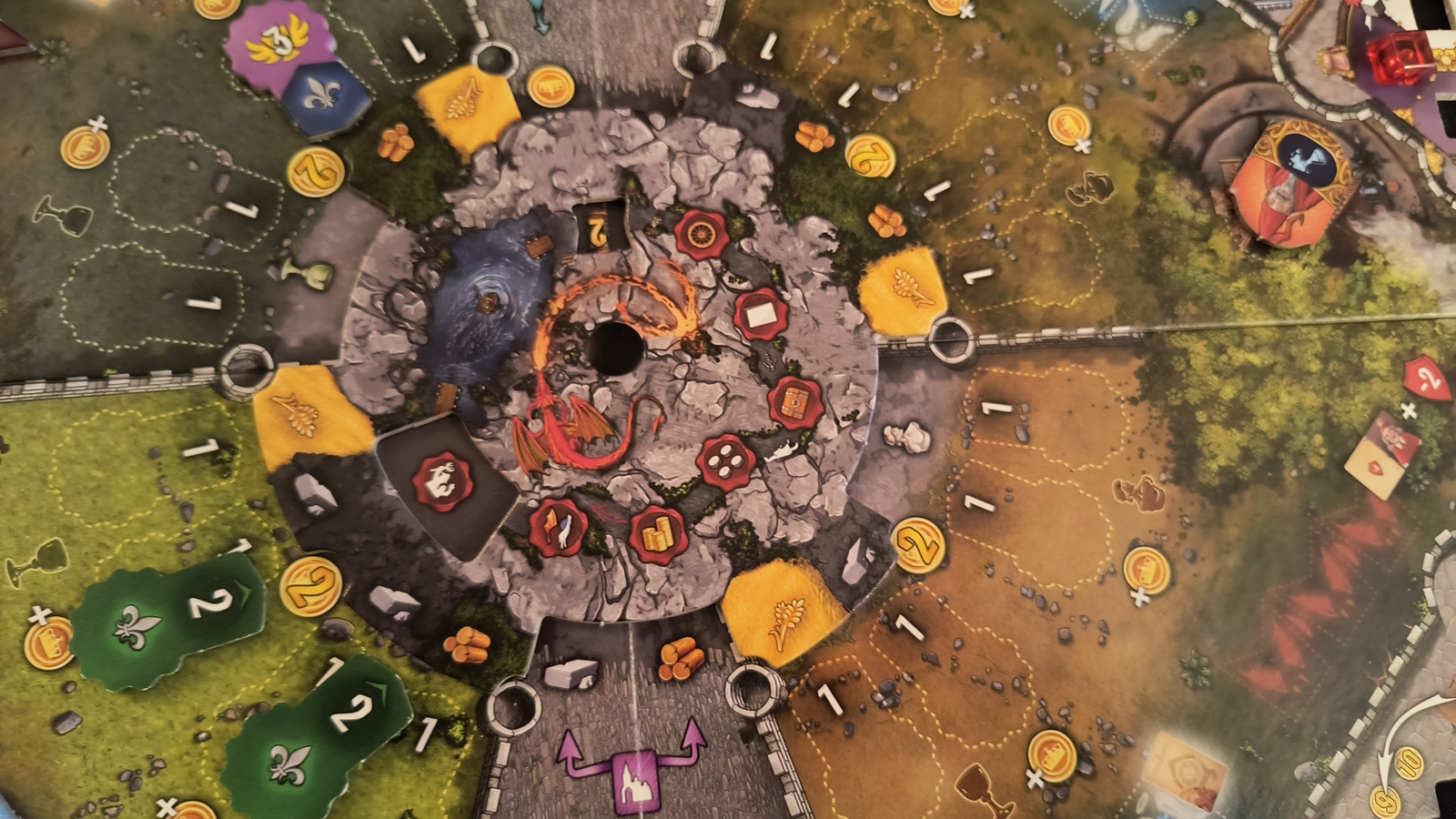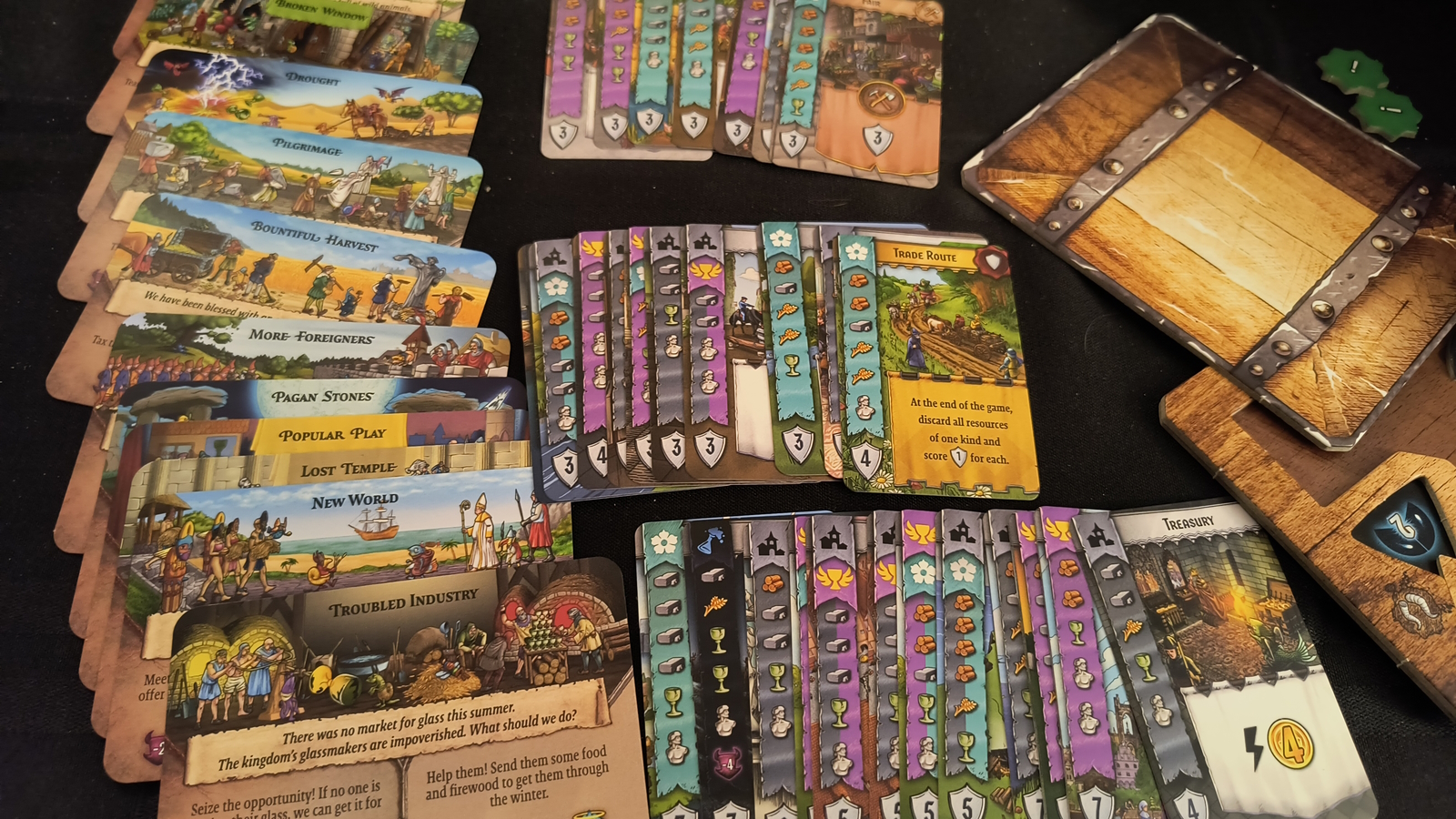The world is clawing its way out of centuries of barbarism and religious stricture, and our little game centers on 4 particular kingdoms. Two of these kingdoms are led by mortals with few resources, but a great hunger for power. Another is the domain of a cult and eager to curry favor with their dark lord. The final kingdom is the domain of the devil themself, who wants for nothing more than mortal souls to make their own, and has the resources those mortals need.
Deal with the Devil is an engine building strategy game with a hidden role mechanic. Each player is trying to build the most prosperous kingdom, but one player is a devil, who has resources to spare, albeit at the small cost of a soul. Deal with the Devil is only playable at 4 players: 2 mortals, 1 cultist, and 1 devil. The mortals start with scant resources, the cultist with a slight advantage in resources, but 2 tainted souls they want to get rid of at any cost, and the devil starts with a veritable treasure trove of goodies, but a ravenous hunger for souls. Every round starts with players gathering resources based on a rotating wheel of goodies, which get stashed behind the walls of their castle before the (black) magic happens.

That magic, of course, is the deal phase, the unique core mechanic of the game. Each player possesses a chest with a QR code on the back, which slides open to allow resources to be left within. After everyone has their resources, they will fill their chests with resources they are willing to trade, and use a dial built into the chest to indicate what they want in return. Mortals can only ever trade resources for gold, the cultist is able to ask for money or a piece of a soul, and the devil must always ask for one or two bits of soul. These chests are distributed semi-randomly by an app on a phone or tablet which reads the QR code on the back, and determines to whom each chest is given. The app makes sure everyone will wind up seeing everyone else’s chest a more or less equal number of times by the time the game wraps up.
Once you take a peek at the deal laid out for you in the chest, you can either choose to take the goods and put the price in the chest, or you can choose to pass on the deal. Each turn, each chest is passed to 2 people before being returned to their owner, all handled by the app. Once that’s done, the rest of the turn completes, with players choosing their actions, such as building buildings, using previously built buildings, hiring retainers, and activating events. These are handled by a sort of programming system in the game, where actions move from the left of the action board to the right. Though that programming system seems somewhat unnecessary to me, since there is no chance of your opponents messing with that plan. It’s just a means for some folks to miscalculate and suffer a minor penalty.

At the end of the second and third turns, players get to turn the screws on each other. There is a vote for who every player thinks is evil, and they then carry out a witch-hunt. The voted on player(s) have to reveal just how many souls they have. If they don’t have a full soul, then they get hit with a minor penalty, but a major amount of suspicion. If you’ve been paying attention, the only reason someone wouldn’t have a full soul is that they are either the Devil, cultist, or got a deal they couldn’t pass up for their soul.
At the end of the third and fifth turns, the inquisition gets involved. Also at the end of the third turn the Devil gets his due. The Devil will use the soul’s they’ve snaked thus far to get even more resources to fuel their future deals. The rest of the players will use this opportunity to oust the Devil and Cultist, as well as bribe the upcoming inquisition. The bribes get rid of up to 3 of the inquisitors, while any others can only be rid of with indulgences, which are acquired for being in good with the church, soul pieces, or, in the worst case, point penalties. Such is the penalty for angering the church. The last turn also nets the Devil points based on their soul pieces, though the number of points they get if they nab 5 soul pieces is absurd.

All of this leads to a tense game of suspicion, intrigue, as well as a pretty competent engine builder as the scenery that this is happening around. The economy is tight, with a debt mechanic to ease the burden initially but tightening the screws through a punitive interest mechanic as the game goes on. The trade mechanic is the most intriguing aspect going on here. How much is wheat worth? Well, you can sell one for a single gold, or buy one for three gold without involving your friends. Are your compatriots needing wheat enough that they will give you 2 for it? Or even more? And what is the worth of a soul? It quickly makes the inquisition go away, which is great, but to the devil, a soul is worth a potential ton of points.
On the other hand, there are some mechanics that don’t really hit for me. The game has a reputation system, but being naughty or nice has fairly minor penalties and conveniences, and certainly don’t feel like they are worth the cost to be good. If you are the “most good” you get angel wings. These are how you get indulgences which are just as good as a piece of soul in dealing with inquisitors. Useful, especially for cultists, but it can be costly to do good all the time. The bad stuff, on the other, sinister hand, is a pretty reliable way to get money and other resources. If you are the worst of the worst, you get devils wings, which earns you a “personal guest” from the inquisition, basically an extra inquisitor for your personal attention. This can be devastating, but that just means you don’t want to be the worst all the time. It doesn’t really feel meaningful, since there is a snap-back mechanic for reputation that doesn’t leave you on the good or bad side for more than a single turn or two.

Deal with the Devil does do something I’ve never seen in a hidden role game, though. It’s a hidden role game that doesn’t really end when the roles are uncovered. If the devil is outed, which could be as early as half-way through the game, the game isn’t over. It’s still quite possible for the devil to win openly. Players are certainly incentivized to hunt the devil and cultist, of course, since there’s points up for grabs for correct guesses, but the devil can win while operating completely in the open without it being too much of a problem for them.
One more interesting detail about the game is how carefully the pacing is controlled. The game does not have any extra cards included for the sake of replayability. Each turn has exactly 16 building cards, with 4 going to each player. Resource distribution will be the same for each playthrough, with the only changes being where around the board each of the 4 players are settled. It’s a bit like chess in that way, with subsequent games of Deal with the Devil not changing in its content, but in the depth of each player’s dealing and double dealing and the actions of the other players around you. Despite this controlled pacing, I played the game several times, with each time feeling like a fresh experience.
Deal with the Devil hits the theme perfectly, and the board is dripping with lovely details and medieval humor. Each player has a massive personal castle playboard which holds your resources, is where you plan your actions, as well as the status of your achievements. The rulebook is written in a style reminiscent of the late Sir Terry Pratchett, with a lot of tongue in cheek embellishments without sacrificing the clarity of the rules. Spread throughout the production are ugly-cute demons and artwork that wouldn’t look out of place in Monty Python and the Holy Grail.
Overall, I really, really like playing Deal with the Devil. If you engage with it on its terms, with a certain amount of humor, cut-throat deal making and a suspicious eye, I think you will as well.

A hidden role game with economic bite. Everyone is trying to build their kingdom. Turn greed into a weapon, use the art of the deal to turn wood into gold, and create the best kingdom. However, beware the devil, who offers the best deals, at the small, small cost of your soul. After all, what is a soul worth?
PROS
- Hits the theme pitch perfectly
- Tight economy and hidden deals lead to a razor-edge power struggle
- Wryly written, tongue in cheek humor all over.
CONS
- Weak reputation system that doesn't really have enough weight in the game for how often it is referenced.
- The game requires exactly 4 players, no more, no less.
- The tightly controlled pacing may result in it going stale eventually, though I never reached that point.
Unpublished game designer, programmer, DM and progressive activist. Always willing to see what cool ideas people have in the board game industry. I love a good gimmick, but strong mechanics are still important.
See below for our list of partners and affiliates:

 1 year ago
146
1 year ago
146







